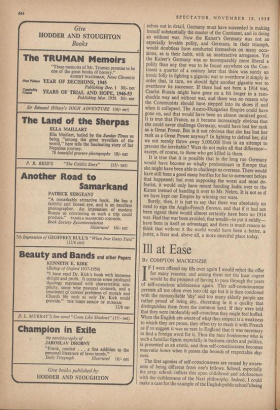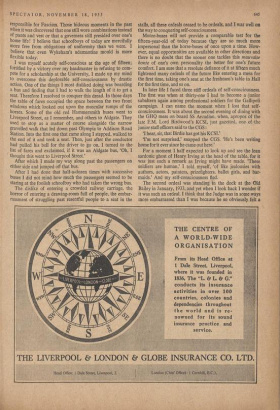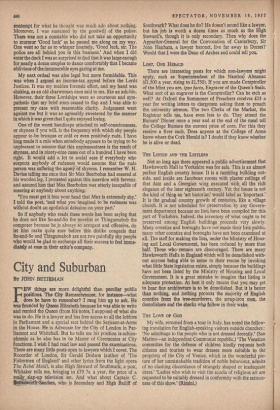Ill at Ease
BY COMPTON MACKENZIE IF I were offered my life over again I would reject the offer for many reasons, and among them not the least cogent would be the prospect of having to pass through the years of self-conscious adolescence again. This self-consciousness persists all too often even into old age but it is then condoned with the monosyllable 'shy' and too many elderly people are rather proud of being shy, discerning in it a quality that distinguishes them from the common herd. If they were told that they were intolerably self-conscious they might feel huffed. When the English are aware of what they suspect is a weakness to which they are prone, they often try to mask it with French as if to suggest it was so rare in England that it was necessary to find a foreign word for it. Thus the faux bonhomme who is such a familiar figure, especially in business circles and politics, is presented as an exotic, and thus self-consciousness becomes mauvaise honte when it passes the bounds of respectable shy- ness.
The first agonies of self-consciousness are caused by aware- ness of being different from one's fellows. School, especially the prep. school, inflicts this upon childhood and adolescence with the ruthlessness of the Nazi philosophy. Indeed, I could make a case for the example of the English public school's being responsible for Fascism. Those hideous moments in the past when it was discovered that one still wore combinations instead of pants and vest or that a governess still presided over one's home life! I believe that schoolboys of today are mercifully more free from obligations of uniformity than we were. I believe that even Wykeham's adamantine mould is more flexible today.
I was myself acutely self-conscious at the age of fifteen; fortified by a victory over my headmaster in refusing to com- pete for a scholarship at the University, I made up my mind to overcome this deplorable self-consciousness by drastic action. One of the things I most disliked doing was boarding a bus and finding that I had to walk the length of it to get a scat. Therefore I resolved to conquer this dread. In those days the table of fares occupied the space between the two front windows which looked out upon the muscular rumps of the horses. Some of the old red Hammersmith buses went to Liverpool Street, as I remember, and others to Aldgate. They used to stop as a matter of course alongside the narrow gravelled walk that led down past Olympia to Addison Road Station. Into the first one that came along I stepped, walked to the end of it and took a seat. Then, just after the conductor had pulled his bell for the driver to go on, I turned to the list of fares and exclaimed, if it was an Aldgate bus, 'Oh, I thought this went to Liverpool Street.'
After which I made my way along past the passengers on either side and jumped off that bus.
After I had done that half-a-dozen times with successive buses I did not mind how much the passengers seemed to be staring at the foolish schoolboy who had taken the wrong bus.
The dislike of entering a crowded railway carriage, the horror of entering a drawing-room full of people, the embar- rassment of struggling past resentful people to a seat in the stalls, all these ordeals ceased to be ordeals, and I was well on the way to conquering self-consciousness.
Motor-buses will not provide a comparable test for the fifteen-year-old of today because they are so much more impersonal than the horse-buses of once upon a time. How- ever, equal opportunities are available in other directions and there is no doubt that the sooner one tackles this mauvaise honte of one's own personality the better for one's future comfort. I am sure that a resolute defiance of it at fifteen much lightened many ordeals of the future like entering a mess for the first time, taking one's seat at the freshmen's table in Hall for the first time, and so on.
In later life I faced three stiff ordeals of self-consciousness. The first was when at thirty-one I had to become a junior subaltern again among professional soldiers for the Gallipoli campaign. I can name the moment when I lost that self- consciousness. It was about the second evening of dining with the GHQ mess on board SS Arcadian, when, apropos of the late F.M. Lord Birdwood's KCSI, just gazetted, one of the junior staff officers said to the CGS: 'I hear, sir, that Birdie has got his KCSI.'
'I'm not surprised,' snapped the CGS. 'He's been writing home for it ever since became out here.'
For a moment I half expected to look up and see the lean sardonic ghost of Henry Irving at the head of the table, for it was just such a remark as Irving might have made. 'These soldiers are human,' I told myself, 'of like jealousies with authors, actors, painters, prizefighters, ballet girls, and bar- maids.' And my self-consciousness fled.
The second ordeal was standing in the dock at the Old Bailey in January, 1933. and yet when I look back I wonder if it was such an ordeal. I think that the Judge was in some ways more embarrassed than I was because he so obviously felt a contempt for what he thought was much ado about nothing. Moreover, I was sustained by the goodwill of the police. There was not a constable who did not take an opportunity to murmur 'Good luck' as he passed me along on my way. One went so far as to whisper hoarsely, 'Good luck, sir. The police are all behind you in this business.' And when I did enter the dock I was so surprised to find that it was large enough for nearly a dozen couples to dance comfortably that I became oblivious of the innumerable eyes gazing at me.
My next ordeal was also legal but more formidable. This was when I argued an income-tax appeal before the Lords Justices. It was my maiden forensic effort, and my hand was shaking, as an old charwoman once said to me, like an ash-bin. However, their three Lordships were so courteous and sym- pathetic that my brief soon ceased to flap and I was able to present my case with reasonable clarity. Judgement went against me but it was so agreeably sweetened by the manner in which it was given that I quite enjoyed losing.
One of the worst handicaps attached to self-consciousness, or shyness if you will, is the frequency with which shy people appear to -be brusque or cold or even positively rude. I have long made it a rule when somebody appears to be trying to be unpleasant to assume that this unpleasantness is the result of shyness, and in ninety-nine cases out of a hundred I have been right. It would add a lot to social ease if everybody who suspects anybody of rudeness would assume that the rude person was suffering the agony of shyness. I remember W. H. Davies telling me once that Sir Max Beerbohm had sneered at his wooden leg. I protested against this assertion with fervour, and assured him that Max Beerbohm was utterly incapable of sneering at anybody about anything.
'You must get it into your head that Max is extremely shy,' I told the poet, 'and what you imagined to be rudeness was without doubt an egotistical delusion on your part.'
So if anybody who reads these words has been saying that he does not like So-and-So the novelist or Thingumabob the composer because he ,is always so arrogant and offensive, do let him make quite sure before this dislike congeals that So-and-So and Thingumabob are not two painfully shy people who would be glad to exchange all their success to feel imme- diately at ease in their critic's company.












































































 Previous page
Previous page